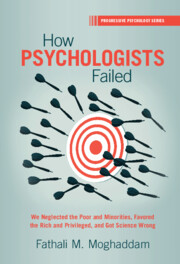 How Psychologists Failed
How Psychologists Failed Book contents
- HOW PSYCHOLOGISTS FAILED
- The Progressive Psychology Book Series
- How Psychologists Failed
- Copyright page
- Dedication
- Contents
- Preface
- Acknowledgments
- Chapter 1 Why We Must Rethink Psychology
- Part I Psychological Processes
- Part II Rethinking Behavior in the Larger World
- Chapter 8 Mental Health and ‘Be Happy’ Psychology
- Chapter 9 Looking through the Wrong Side of Prison Bars: The Psychology of Injustice
- Chapter 10 Psychology for the Masses in Non-Western Societies
- Part III Looking Ahead
- Notes
- References
- Index
Chapter 8 - Mental Health and ‘Be Happy’ Psychology
from Part II - Rethinking Behavior in the Larger World
Published online by Cambridge University Press: 27 October 2022
- HOW PSYCHOLOGISTS FAILED
- The Progressive Psychology Book Series
- How Psychologists Failed
- Copyright page
- Dedication
- Contents
- Preface
- Acknowledgments
- Chapter 1 Why We Must Rethink Psychology
- Part I Psychological Processes
- Part II Rethinking Behavior in the Larger World
- Chapter 8 Mental Health and ‘Be Happy’ Psychology
- Chapter 9 Looking through the Wrong Side of Prison Bars: The Psychology of Injustice
- Chapter 10 Psychology for the Masses in Non-Western Societies
- Part III Looking Ahead
- Notes
- References
- Index
Summary
The causal-reductionist model has resulted in a classification system and set of treatments for mental health that assumes people are self-contained individuals, operating independent of context. Despite the good efforts of community psychology and a number of progressive therapists, as well as the historic meaage of the anti-psychiatry movement, the powerful role of social class and particularly poverty on mental health is disregarded. This is epitomized by the positive psychology movement, the focus on individual happiness (independent of context), and the development of a 'happiness index' which regards progress as being independent of GDP and other material measures. In essence, 'positive thinking' and 'be happy psychology' is proposed as a solution. But even positive psychologists have been forced to admit that the probablity of mental health problems increases as we move down the social classes, so that poverty is a powerful context leading to a higher probability of individuals suffering mental health problems.
Keywords
- Type
- Chapter
- Information
- How Psychologists FailedWe Neglected the Poor and Minorities, Favored the Rich and Privileged, and Got Science Wrong, pp. 105 - 118Publisher: Cambridge University PressPrint publication year: 2022
